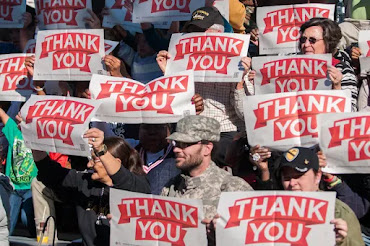Veterans Day Facts

Veterans Day is a notable American occasion,
yet there are additionally a couple of misinterpretations about it like how
it's spelled or whom precisely it celebrates. To get some freedom from that,
here are the significant realities you ought to be aware of. Veterans Day began
as "Truce Day" on November 11, 1919, the primary commemoration of the
finish of The Second Great War. Congress passed a goal in 1926 for yearly
recognition, and November 11 turned into a public occasion starting in 1938.
Not at all like Dedication Day, Veterans Day honors generally American veterans
— living or dead — yet particularly offers gratitude to living veterans who
served their country decently during war or peacetime.
Individuals that spell it 'Veteran's Day"
or "Veterans' Day," they're off-base. The occasion isn't a day that
"has a place" for one veteran or numerous veterans, which is what punctuation
infers. It's daily for regarding all veterans — so no apo A many individuals
believe it's "Veteran's strophe required. A great deal of Americans get
this confounded, and we'll tell the truth — it tends to be a little irritating to
every one of the living veterans out there.
Dedication Day is a memorable opportunity for
the people who gave their lives for our nation, especially in the fight or from
wounds they experienced in the fight. Veterans Day praises those who have served
the nation in war or harmony — in any condition — despite the fact that
expressing gratitude toward living veterans for their sacrifices is generally
planned. The Second Great War authoritatively finished when the Arrangement of
Versailles was endorsed on June 28, 1919. In any case, the quarreling finished
over seven months before that when the Partners and Germany put into the impact a
truce on the last minute of the 11th day of the 11th month.
Hence, Nov. 11, 1918, was generally viewed as
the finish of "perhaps the greatest conflict in history" and named
Truce Day. In 1926, Congress formally acknowledged it as the finish of the
conflict, and in 1938, it turned into an authority occasion, principally a day
put away to respect veterans of The Second Great War. However, at that point
The Second Great War and the Korean Conflict occurred, so on June 1, 1954, at the
asking of veterans administration associations, Congress revised the
celebration once more by changing "peace negotiation" to
"veterans" so the day would respect American veterans, everything
being equal, For some time, Veterans Day's date was changed, as well, and it
confounded everyone. Congress marked the Uniform Occasion Bill in 1968 to
guarantee that a couple of government occasions Veterans Day included would be
praised on a Monday. Authorities trusted it would spike travel and other family
exercises over the long end of the week, which would invigorate the economy.
On Oct. 25, 1971, the primary Veterans Day
under this new bill was held. We don't know why it required three years to
execute, however of course, there was a great deal of disarray about the
change, and many states were miserable, deciding to keep on perceiving the day
as they recently had — in November. Within a couple of years, it turned out to
be really clear that most U.S. residents needed to observe Veterans Day on Nov.
11, since it involved noteworthy and enthusiastic importance. So on Sept. 20,
1975, President Gerald Passage marked another regulation (Public Regulation
94-97), which returned the yearly recognition to its unique date beginning in
1978.
The Second Great War was a global exertion,
so it's a good idea that our partners likewise needed to praise their veterans
on Nov. 11. The name of the day and the sorts of recognitions contrast, be that
as it may. Canada and Australia both call Nov. 11 "Recognition Day."
Canada's recognition is like our own, except for large numbers of its residents
wearing red poppy blossoms to respect their conflict dead. In Australia, the day
is more like our Dedication Day. Incredible England refers to it as
"Recognition Day," as well, yet notices it on the Sunday nearest to
Nov. 11 with marches, administrations, and two minutes of quietness in London
to respect the people who lost their lives in war.
• Veterans
Day occurs on November 11 every year in the United States in honor of the
“eleventh hour of the eleventh day of the eleventh month" of 1918 that
signaled the end of World War I, known as Armistice Day.
• In
1954, President Dwight D. Eisenhower officially changed the name of the holiday
from Armistice Day to Veterans Day.
• In
1968, the Uniform Holidays Bill was passed by Congress, which moved the
celebration of Veterans Day to the fourth Monday in October. The law went into
effect in 1971, but in 1975 President Gerald Ford returned Veterans Day to
November 11, due to the important historical significance of the date.
• Veterans
Day commemorates veterans of all wars.
• Great
Britain, France, Australia, and Canada also commemorate the veterans of World
War I and World War II on or near November 11th: Canada has Remembrance Day,
while Britain has Remembrance Sunday (the second Sunday of November).
• In
Europe, Great Britain, and the Commonwealth countries it is common to observe
two minutes of silence at 11 a.m. every November 11.
• Every
Veterans Day and Memorial Day, Arlington National Cemetery holds an annual
memorial service. The cemetery is home to the graves of over 400,000 people,
most of whom served in the military.


Comments
Post a Comment